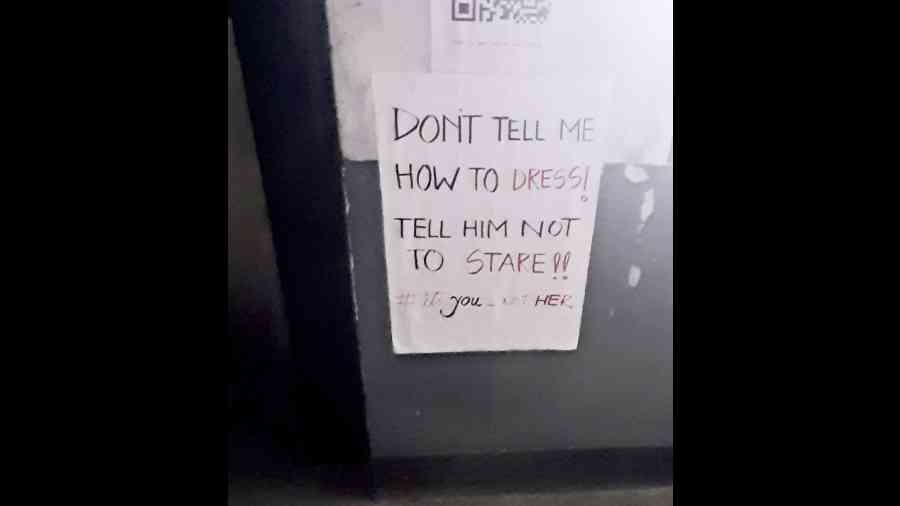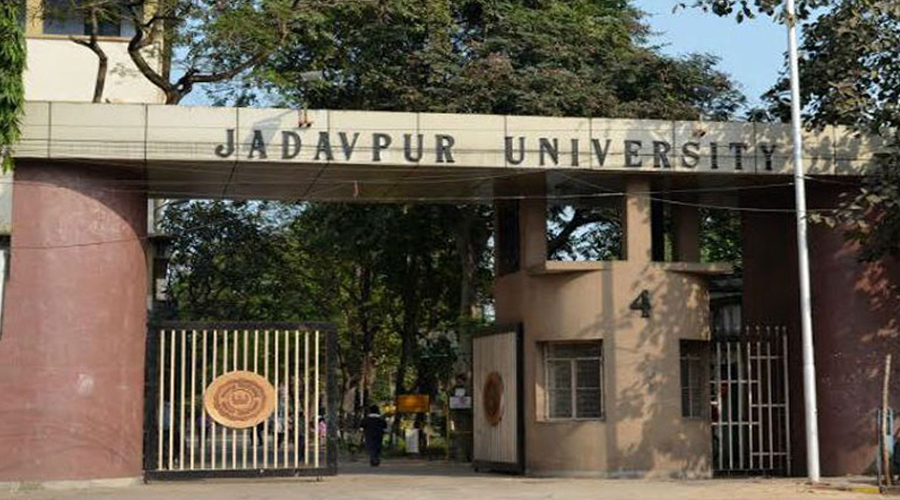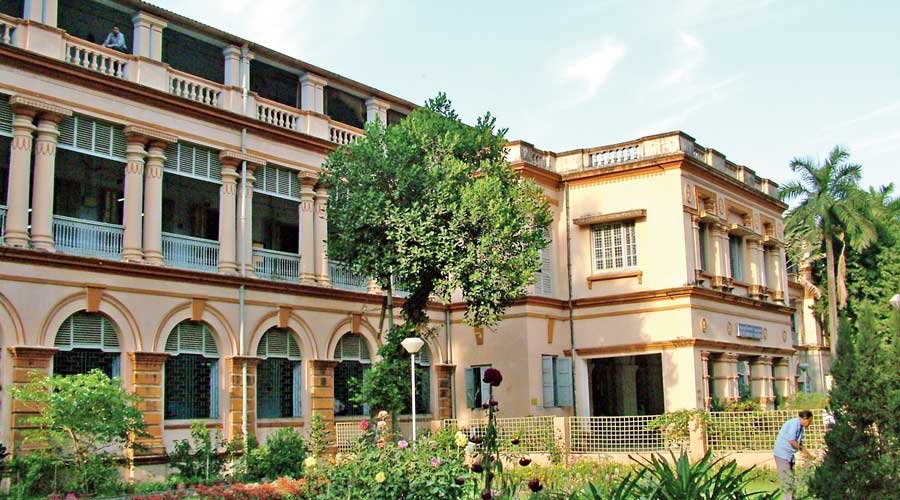On October 18, as many as 35 students of Jadavpur University filed an application for a general diary at Jadavpur police station, listing allegations of inappropriate behaviour against a professor in the institution.
The slew of charges mentioned against the professor included taking photographs of female students without their consent, inappropriate physical contact, uninvited comments about the students’ looks, dress, figure and social life, and intimate questions and remarks about the size of bed a girl would require with her partner and which girl would be “better as wife material”.
At the end of the printed application, which was signed by the 35 students who included male and female students, a handwritten note was added: “We don’t want a case for the time being.”
One of the students told The Telegraph that the officer in charge of the police station told them to add that line. “He told us to write that we did not want a case to be registered for the time being.”
Asked by this newspaper, a senior police officer said: “The officer in charge of Jadavpur police station had told the students that from the nature of their complaint, he was bound to draw up an FIR. The students had, however, said they did not want an FIR for the time being as it was not their personal decision to take.”
As the OC repeated that he would be bound to start a case going by the content of the letter of complaint, the students gave it in writing that they did not want a case for the time being, the officer said.
A general diary, unlike an FIR, does not require the mandatory registration of a case.
The students said that seven or eight of them were in the police station when the OC spoke to them and they agreed to add the line since the consensus earlier was to seek a general diary entry and it would have been difficult to contact and discuss with the rest of the 35 students a change in the nature of the complaint.

A poster against the alleged harassment Sourced by The Telegraph
The police said they had sought a report from the university on the findings of the Internal Complaints Committee (ICC) of the varsity that is looking into a separate complaint filed by the students on September 12.
The matter is pending before the ICC. The professor has denied the allegations. The law prevents the publication of any information that can lead to the identification of the complainants.
The best practice usually is to await the outcome of the inquiry. But the accounts by some of the students, who approached The Telegraph, threw up certain factors that this newspaper thinks require the attention of policymakers and experts who deal with such complaints.
The students have accused the professor of taking their photographs without their consent on September 9.
A student said that when one of them confronted the professor and requested him to delete the photographs, his gaze made her uncomfortable. He had also called her “psychologically disturbed”, the student added.
Three days later, on September 12, the students registered with Jadavpur University the complaint of “inappropriate behaviour” against the teacher, following which the university referred the case to the ICC.
Under the existing laws, the ICC has time till December 11 (three months) to file a report based on its inquiry.
After two months and three depositions by the students, they feel that the ICC has been insensitive towards them. Several students who spoke in confidence to his newspaper said they were “losing faith” in the ICC.
“On the very first day of the hearing on September 22, one of the members was late and hence the deposition of one of the complainants had to be postponed,” said a student.
The student was given a fresh date on October 13. However, a few hours before the hearing was to start, the student was apparently sent a mail informing her that the hearing had been postponed again as the “external member of the ICC was unwell”.
“The hearing that was to be held on September 22 was finally held a month later on October 20,” said the student.
She added that the insensitive approach made the students feel insecure.
The student said the accused teacher was “loitering around the building” on September 22 when one student was deposing and a second was about to enter the building for her deposition. She alleged that one of the members of the ICC received a call from the teacher while the deposition was in progress.
“After the deposition, this member of the ICC was heard telling a colleague that the accused teacher was calling again and again while the hearing was going on,” the student said.
The ICC member could not be contacted by this newspaper for corroboration. In any case, ICC members are barred by law from discussing the proceedings with the media.
The accused teacher told The Telegraph: “The allegations that have been made against me before the police and the internal complaints committee are baseless. I did not know when the students went for deposition. So the allegation that I was loitering outside the building the students went to for deposition and making phone calls to the members of the committee at the time of deposition are untrue.”
Asked why the students were levelling the allegations against him, the accused professor said: “This is part of a conspiracy to malign me. I have deposed before the committee about this as well. Let the committee give its report. I have full faith in the committee.”
A former official of a university who had worked as a member of the ICC of that university said that since the accused happens to be in a position of power on the campus, the committee must ensure that the complainants can submit their grievances without any fear or coercion.
“That is why the UGC has said the responsibilities of the committee include providing assistance if any employee or student ‘chooses to file a complaint with the police’, among others,” she said.
The ICC was created by the University Grants Commission under the Prevention, Prohibition and Redressal of Sexual Harassment of Women Employees and Students in Higher Education Institutions Regulations.
The UGC regulations say a probe has to be completed within 90 days from the receipt of the complaint. “The inquiry report, with the recommendation, if any, has to be submitted within ten days from the completion of the inquiry to the executive authority of the institution,” the regulations say.
The committee has the responsibility, according to the regulations, to provide assistance if any employee or student “chooses to file a complaint with the police”.
By speaking out, the students have flagged concerns that so far seem to have escaped the attention of policymakers and educators.
One, the three-month window for the ICC, which is in line with the norms, may not be too long in a workplace where careers can usually stretch for decades. But for a university student, three months are a substantial part of the course.
Keeping the students on tenterhooks for such a duration takes an unacknowledged toll on their studies as well as fanning fears of a cover-up and possible retaliation that can spill over into their future professional careers. This is especially true of applied subjects in which academics play an active role in projects outside the campus that may have a bearing on the students’ careers.
Two, little appears to have been done by the university to reassure the students other than taking the routine -- and appropriate -- step of referring the matter to the ICC and asking the accused teacher to stay away from the campus for the time being. It also appears that the students were not given adequate information on the legalities involved.
One of the students said they had sent a letter to the head of the department on September 12 seeking the professor’s suspension. The students said they had tried to meet the vice-chancellor at least 15 times but in vain. So, they sent a letter to the VC too.
The students said it had been verbally communicated to them to seek a general diary entry at the police station, following which the professor would be suspended. The students did so on October 18 but after running into fresh stumbling blocks.
“We went to make a GD. But the process was very painful. At first, the police told us they could take the GD only when a copy of the complaint was forwarded by the pro-VC,” a student said.
A student leader unconnected with the complaint conveyed the request to the proVC, and he agreed to forward the letter to the police station, the student said. “But after some time, we got to know that the authorities were not going to forward it to the police station, stating that they could not forward each and every complaint made to them to the police station.”
It was then that the students spoke to the OC.
Eventually, the VC met them on November 2 -- almost two months after their complaint. “On November 2, we met the VC for the first time and requested him to suspend the professor as he was found roaming around the building while the ICC hearing was going on. The VC and the pro VC told us that the professor cannot be suspended because he might move court against the university and win the case, which would bring a bad name to the university,” a student said.
“On repeated requests, the VC requested the accused professor not to enter the university premises for the time being. But he was recently seen in the department,” the student added.
“We repeatedly visited the office of the VC to meet him but couldn’t manage to meet him. We were informed by a female member of the staff one day that the VC was very busy; he had more important things to do. When told that we were there repeatedly during office hours and he was not there, we were asked not to raise questions about an elderly person,” the student said.
JU vice-chancellor Suranjan Das, while responding to a text message from this newspaper, said: “You may contact the Presiding Officer, ICC.” Later, asked about the purported delay in meeting the students, Das said: “That allegation is wrong. There has been no instance of my refusal to meet students. Who has complained? All student issues are handled initially by the pro-VC. It is unfortunate that this allegation has been made. The investigation is being undertaken by ICC as per rules and, as per rules, the university administration cannot intervene in the process.”
The VC did not respond to the question whether he had advised the students to lodge the general diary. The picture emerging from the accounts suggests that the grievance of the students has not been addressed in a manner that reassures them and puts them at ease — the principal objective of any redress system.











